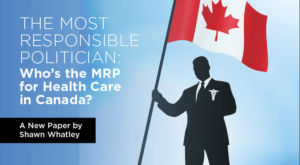 Everyone wants better health care in Canada. But no one knows who should fix it. Who’s the most responsible politician (MRP)?
Everyone wants better health care in Canada. But no one knows who should fix it. Who’s the most responsible politician (MRP)?
The provinces are in charge, according to the constitution.
But the federal government is in charge based on the Canada Health Act (CHA) plus billions in Canada Health Transfer payments (CHT).
It’s like two people in a rowboat, one on each oar, both trying to row in different directions. It’s fun to watch, but painful to ride.
I wrote “The Most Responsible Politician: Who’s the MRP for Health Care in Canada”, with the Macdonald-Laurier Institute this summer.

Here’s the press release summary.
For a 2-minute version, check out the blog below.
Who’s MRP for Health Care?
The MRP concept is old. Most Responsible Physician (MRP) now includes Practitioner, with NPs as MRP in some cases.
When dozens of people run from all across the hospital to help a patient who is turning blue, one person needs to be in charge of the Code Blue.
Every major trauma needs a Trauma Team Leader. Someone needs to lead and take responsibility for team decisions.
Admitted patients come to harm if they do not have a clear and explicit MRP.
Canadian healthcare has no clear MRP.
Provinces run daily operations. Their authority comes from the British North America Act (1867). But the feds have ‘spending power’, which is the power to make payments “for purposes on which it (Parliament) does not necessarily have the power to legislate” (PE Trudeau).
In other words, the feds use money to get power. Instead of seeking a constitutional amendment, they can give grants with strings attached, called conditional funding. Continue reading “Going Nowhere Fast — Who’s the MRP for health care?”




